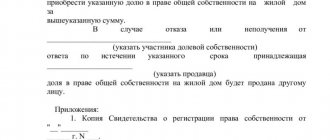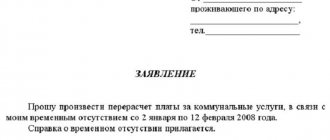New edition of Art. 250 Civil Code of the Russian Federation
1. When selling a share in the right of common ownership to an outsider, the remaining participants in shared ownership have the pre-emptive right to purchase the share being sold at the price for which it is sold, and on other equal conditions, except in the case of a sale at public auction, as well as cases of sale of a share in the right of common ownership of a land plot by the owner of a part of a building or structure located on such a land plot or by the owner of premises in the specified building or structure.
Public auctions for the sale of a share in the right of common ownership in the absence of consent of all participants in shared ownership may be held in the cases provided for by part two of Article 255 of this Code, and in other cases provided for by law.
2. The seller of a share is obliged to notify in writing the other participants in shared ownership of his intention to sell his share to an outsider, indicating the price and other conditions under which he sells it.
If the remaining participants in shared ownership do not acquire the sold share in the right of ownership of real estate within a month, and in the right of ownership of movable property within ten days from the date of notification, the seller has the right to sell his share to any person. If all other participants in shared ownership refuse in writing to exercise the pre-emptive right to purchase the share being sold, such share may be sold to an outsider earlier than the specified deadlines.
The specifics of notifying participants in shared ownership of the intention of the seller of a share in the right of common ownership to sell his share to an outsider may be established by federal law.
3. When selling a share in violation of the pre-emptive right, any other participant in shared ownership has the right, within three months, to demand in court the transfer of the rights and obligations of the buyer to him.
4. Assignment of the pre-emptive right to purchase a share is not permitted.
5. The rules of this article also apply when alienating a share under an exchange agreement.
Who needs to be notified about the desire to sell a share in an apartment
The preemptive right to purchase a share is defined in Art. 250 Civil Code of the Russian Federation. It states that, regardless of the degree of relationship between the seller and the buyer, the main contenders for a paid portion of the apartment are other co-owners.
This means that if you decide to sell your share in a residential property, the first step is to notify the other co-owners of your intention.
It should also be taken into account that if you subsequently sell your share to other persons (not the owners of other parts) for an amount that is less than that which was offered to the co-owners, then such a transaction can be considered invalid.
In addition to notifying other apartment owners, the law does not oblige you to tell anyone about your plans to alienate the property.
You cannot assign your pre-emptive right to acquire a share. That is, only the co-owner needs to report the intention to sell part of the apartment, and not his relatives and authorized representatives.
Notification is only required in the case of the sale or exchange of part of the property. If you decide to give it as a gift, no one will have priority rights. However, if, under the guise of a gift agreement, a purchase and sale transaction is nevertheless carried out (money is transferred), then in the future interested parties will be able to recognize it as void. We have already talked about how to carry out this procedure correctly in the article “Agreement for the donation of a share in an apartment.”
Expenses, cost
The method of delivery of letters affects the financial costs on the part of the seller. Choose the option that is closest to you in terms of budget:
| Personal delivery “from hand to hand” | If you live in the same city, costs are minimal. When delivering to another city, you will have to spend money on a taxi, gasoline and accommodation. |
| Valuable letter | The costs for sending valuable and registered letters are approximately the same: • 50 rubles – registered mail; • 110 rubles – valuable letter (up to 20 grams by weight – and everything above is paid at other rates + 3 rubles per gram) |
| By proxy | You will need to certify a power of attorney to send/receive notifications: • 200 rubles – for document certification; • notary services (UPTH) – up to 5,000 rubles |
| Notarial services | Expenses depend on the region of residence and the price list of the notary's office: • state duty - from 80 to 300 rubles ; • other services – up to 5,000 rubles. |
| Via courier | Express delivery by courier service will cost from 150 rubles and more, depending on the route |
So, in order to sell a share in an apartment, you need to inform the current co-owners about the transaction. The responsible person draws up and sends proposals to shareholders. The transfer of letters occurs at the request of the sender: in person, by mail, by courier, by power of attorney or through a notary. Responses to proposals are received within 30 days. If no one agrees to buy out the share in the apartment, the seller will have the right to negotiate with third parties.
Are you worried about drawing up a notice of sale of a share? It is not surprising that for many people this is stressful, and some do not even know about this procedure. In order not to ruin the deal, to maintain your nerves and dignity, seek advice from a lawyer.
Sources
- https://allo-urist.com/obrazets-o-predlozhenii-vykupa-doli-v-kvartire/
- https://allo-urist.com/uvedomlenie-o-prodazhe-doli-v-kvartire-v-obshhej-dolevoj-sobstvennosti/
- https://ros-nasledstvo.ru/uvedomlenie-o-prodazhe-doli-v-kvartire-v-obshhej-dolevoj-sobstvennosti/
- https://o-nedvizhke.ru/dokumenty/uvedomleniya/uvedomlenie-o-prodazhe-doli-v-prave-obshhej-dolevoj-sobstvennosti-obrazec.html
- https://law-divorce.ru/obrazets-o-predlozhenii-vykupa-doli-v-kvartire/
Form and procedure of notification
In Part 2 of Art. 250 of the Civil Code of the Russian Federation states that notification of the desire to sell one’s share in an apartment must be in writing. Therefore, even if there is a trusting, family or friendly relationship between the co-owners, you should not neglect this procedure and simply obtain verbal consent to sell to other persons. Subsequently, such a transaction may be recognized as illegal.
There are several ways to send this document, each of which has advantages and disadvantages. Let's look at them in more detail:
| Notification | Positive aspects | Negative aspects |
| Hand over to the co-owner with his receipt stamp | Most often this is the simplest and most inexpensive way. | The location of the co-owner is not always known; he may also not want to sign the document, thereby delaying the transaction for the alienation of housing |
| Use the services of Russian Post | Receive a notification with the exact delivery date, saving your time on meeting with the owner. This is especially true if he permanently resides in another city. | A significant waste of time, there is no guarantee that the recipient will receive your letter, for example, if he has changed his address |
| Submit a notice using the services of a notary office | The most reliable and simple procedure: there is no need to draw up a document yourself or meet with another owner | Often this procedure is the longest and you will have to spend a significant amount of money. |
Which delivery method to choose is up to you to decide, based on your specific conditions and situation.
Why is it necessary to notify the other owner?
Notifying the other owner is not a mere formality. By sending such a notification, a person not only notifies the co-owner about the upcoming sale, but also invites him to buy out the share as a matter of priority .
According to Art. 250 of the Civil Code of the Russian Federation (Civil Code of the Russian Federation), co-owners have a preemptive right to acquire a share put up for sale. This provision is fundamentally important - the Seller cannot immediately offer his part of the property to outsiders if he has not previously offered the property to co-owners in the prescribed manner.
This rule applies only to those situations where a group of people owns real estate on the basis of common shared ownership. If we are talking, for example, about the sale of an apartment that is individually owned and assigned to only 1 person, the process of alienation for compensation does not involve notifying any other persons. There is no need to draw up a notice even if all shareholders decide to sell the entire apartment they own, together, under a common agreement.
If you want to sell a share in an apartment that is jointly owned (for example, owned by spouses), the parties will first need to “re-qualify” the principle of ownership itself - from joint ownership to shared ownership. You can divide a common apartment into specific shares either in the notary’s office (voluntarily) or in the courtroom (compulsorily).
Subsequently, each spouse will be able to make independent property transactions with their own share. In case of any paid alienation of his share, the owner will first need to comply with the pre-emptive right of acquisition that his partner has (if according to the documents he is indicated as the 2nd co-owner).
Procedure for selling a share of an apartment after notification
Once the co-owners have received your notice of sale of the share with a specific specified amount, they have 1 month to make a decision. If you do not receive a written response within this period, you can proceed further. But the message about the intention to sell the home, indicating the date of receipt by the addressee, must be saved so that in case of disputes you have indisputable evidence.
If the co-owners of the residential premises decide not to purchase a share before the expiration of the month, then they can write a refusal and then there is no need to wait 30 days for further sale.
After receiving a refusal, you must proceed as follows:
- To make an agreement. You can read how relatives can do this in our article “How to buy out a share in an apartment from a relative.”
- Registration with a notary. In accordance with the requirements of Federal Law No. 122 “On registration of rights to real estate and transactions with it”, starting from 2021, all transactions made with shares of apartments are subject to mandatory certification at a notary’s office.
- Transfer of property and money. The order of these procedures is determined by the parties during the signing of the purchase and sale agreement.
- Registration in Rosreestr. For this, a state fee is paid. In 2021, its amount is 2,000 rubles, the necessary documents are collected and after 14 days an extract from the Unified State Register of the new owner is obtained.
How to serve a notice on co-shareholders
The notice of sale of a share, which also contains a proposal for its preemptive acquisition, must not only be written, but also correctly handed over to the other co-owners. The difficulty here is that the Seller will need to protect himself from a legal point of view. Subsequently, the shareholders may declare that they did not receive any notices in principle, which means that the transaction for the sale of the share can and should be declared invalid. To prevent this from happening, the Seller will need:
- choose the correct method for sending notifications;
- keep documentary evidence of writing and sending notifications.
Mailing
One of the most common ways of transmitting a notice is by sending a telegram with return receipt requested or a valuable letter with an inventory of the contents and a return receipt.
This method turns out to be quite convenient for the Seller, because he does not have to “run” after the co-owner. At the same time, he still has in his hands real evidence of compliance with the pre-emptive right of purchase ( checks and shipping receipts issued by the post office). However, on the other hand, the Seller is still not immune from litigation with the co-owner, who allegedly did not receive the notice.
The seller who wants to do everything possible to notify the co-owner is recommended to find out the address of his actual residence in order to send a telegram or valuable letter there. The police, prosecutor's office or central address bureau can help with this. When contacting these authorities, the Seller should keep a copy of his application/request in order to provide all these materials in court if necessary.
In accordance with Art. 165.1 of the Civil Code of the Russian Federation, a notification will be considered delivered if it reaches the addressee, but due to circumstances depending on it, is not received by him.
However, in actual judicial practice, a more ambiguous situation arises: for example, some authorities satisfy the claims of uninformed co-owners. The following explanation for such decisions is given: The seller allegedly cannot confirm the fact that the co-owner has received a notice of sale. Consequently, the latter was not able to exercise his pre-emptive right.
Transfer from hand to hand
If all co-owners live together or close to each other, notices can be distributed in person. However, in this case, the Seller will need to prepare a second copy for each notice in advance. On these duplicates, co-owners will need to indicate:
- your full name (in full, without abbreviations);
- signatures;
- date of acceptance and familiarization with the document.
In real life, this method of transmitting notifications is rarely used - co-owners may live far from each other, be in difficult relationships, etc.
Transfer through a notary
Another option for transmitting notices to co-shareholders is to use the services of a notary. The only disadvantage of this method is the need to pay for notary services.
The final price will depend on how many shareholders need to be notified. If the Seller does not know the exact address of the co-owner, then the notice will need to be sent to several different addresses - then the cost will be higher. And yet, for the required fee, a specialist:
- independently prepare notifications based on the forms available to him;
- on its own behalf will send registered letters to the addressees with an inventory of the contents and notification of delivery;
- will ask the co-owners to notify him in a timely manner of their intentions regarding the property being sold.
After 30 days, the notary may issue to the Seller 1 of the following documents:
- Certificate of transfer of application. It is issued if the letter has been delivered to the addressee.
- Certificate of non-transfer of application. It is issued if a letter was sent, but for some reason never reached the addressee. At the same time, this document indicates that the Seller has taken all necessary measures in an attempt to notify the co-owner of the sale of the share.
What to do if the right of pre-emption is violated
Often, the rights of co-owners of residential premises when one of them sells their share is violated for one reason or another. This could be simple ignorance of the law, or a desire to “annoy” your roommates.
Violation of rights can occur in two cases:
- the share was sold without any notice to other participants in the shared ownership;
- the share was sold before the statutory period of 1 month before receiving a refusal.
In both of these cases, the legislator is on the side of the co-owners. Each of them can, within 3 months, file a lawsuit and restore their rights. However, according to the resolution of the Plenum of the Supreme Court of the Russian Federation No. 10 and the resolution of the Supreme Arbitration Court of the Russian Federation No. 22 of April 29, 2010 “On issues arising in the resolution of disputes related to the protection of property rights,” this three-month period is calculated from the moment when the violation was discovered.
Example. Sokolov and Bragin owned a two-room apartment in equal shares (½ each). Sokolov did not actually live in the apartment. In 2015, he decided to sell his part of the housing, but did not notify Bragin, but made a deal with Ivanova. She, in turn, also did not apply for living in the apartment. In [current_date format='Y'] year, Bragin collected documents to obtain a loan and, among other things, ordered an extract from the Unified State Register of Real Estate, so he learned that the second half of the apartment actually no longer belonged to Sokolov. Then he went to court, and the deal to sell part of Ivanova’s home was declared illegal, despite the fact that 3 years had passed since it was completed.
Statement of claim
In order to defend your priority right to acquire part of the shared property, you must draw up a statement of claim and apply with it to a district court of general jurisdiction. The claim is drawn up according to the general rules specified in Art. 131-132 Code of Civil Procedure of the Russian Federation.
It should be noted that the defendants will be both the buyer and the seller, and the third party will be the Rosreest authority that made the changes to the Unified State Register.
Required documents
Along with the claim, the following package of documents is sent to the justice authority:
- extract from the Unified State Register of Real Estate for the plaintiff’s property (certificate of ownership – until 2021);
- a copy of the applicant's passport;
- document providing the basis for the plaintiff’s acquisition of rights to a share of the apartment (privatization agreement, certificate of inheritance, etc.);
- an extract from the house register (apartment card) about persons registered in the housing;
- technical documentation for the property;
- receipt of payment of state duty;
- a receipt for crediting money to the account of the Department of the Judicial Department under the Armed Forces of the Russian Federation in the amount of the cost of part of the apartment (it is equal to the amount for which the unscrupulous seller has already sold part of the housing, i.e. is the price of his share);
- copies of statements for each defendant and for the judge.
Deadlines
It is impossible to determine the exact time frame for consideration of the claim. It all depends on the positions of the parties, the need to appeal decisions, and in some cases, the need to conduct various examinations. For example, handwriting analysis, if there are doubts about the reality of the notification. However, the court of first instance will definitely not make a decision earlier than 2 months from the date of filing the claim.
Price
The amount of the mandatory fee when filing a claim in the court of first instance depends on the value of the claim. That is, from the amount for which the share has already been sold. The amount of the state duty is regulated by the provisions of Art. 333.19 Tax Code of the Russian Federation.
Notary's help
Often, co-owners create obstacles in the event of selling a share to third parties. Such actions are especially common if the seller did not actually live in the apartment, but fulfilled the obligation to pay for utilities properly. In order not to lose the opportunity to use the property, co-owners avoid receiving notification.
Example. After the divorce, the apartment acquired during marriage was divided between the former spouses in ½ shares. However, the man remained to live there with his new family. And the ex-wife was refused when she tried to move in. Appeal to the court did not yield any results. The woman decided to sell her share. She prepared a notice and sent it to her ex-husband. But the man did not take action to receive the letter, did not open the door, and avoided meetings.
If such a situation arises, the seller must contact a notary office.
Procedure for notarial notification:
- Submitting an application to a notary.
- Payment of duty.
- Formatting a letter.
- Sending documents to the co-owner.
If a letter is received or a refusal is issued, the notary issues a certificate of delivery of the notification.
The situation is more complicated if the documents were not served. The notary has the right to issue a document indicating non-receipt of notice. But often specialists shy away from issuing information about non-receipt.
Important! It is advisable to check with the notary in advance which document will be issued in case of refusal.










